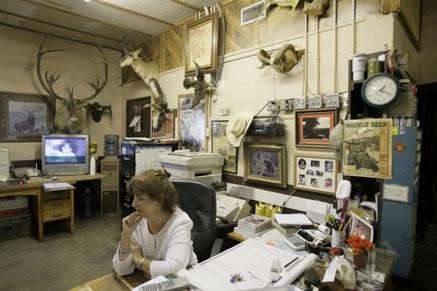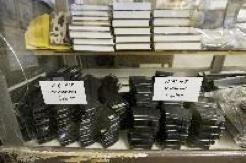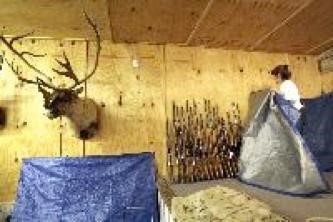How flexible laws, a blissful ignorance and profit motive enable U.S. gun retailers to feed Mexico’s bloody civil war

International gun trafficking prosecutions against licensed gun dealers are relatively rare. The law provides more protection to sellers than to any other part of the supply chain delivering weapons to Mexico’s drug cartel foot soldiers. Much of the current U.S. law enforcement activity targets the battalions of shadowy “straw buyers,” U.S. citizens who can pass the mandatory FBI background check. But straw buyers couldn’t do business without their witting and unwitting trading partners, American gun merchants.
LAREDO, Texas — 2003 was a very bad year across the Rio Grande in Nuevo Laredo. But it was a very good year for Mando’s Guns and Ammo in this South Texas border city north of the river.
As open warfare between rival drug cartels were filling the streets of Nuevo Laredo with bodies that year and the next, Armando and Diana Villarreal, owners of Mando’s, were prospering from a seemingly coincidental spike in demand for AK-47 semi-automatic assault rifles.
“We were selling in quantity,” recalled Diana Villarreal, who took over the store after her husband died in late 2006. “We weren’t getting rich, but it was nice to have money to buy extra things.”
Among those things was a 51-acre ranch outside of town.
Federal agents, though, eventually learned the spike in Mando’s business and violence across the river was no mere coincidence. More than 50 AK-47s recovered after the heat of battles in Nuevo Laredo were traced to Mando’s.
In October 2006, Villarreal died of cancer just before federal prosecutors could make a rare example of him as a federally licensed firearms dealer who crossed the legal line into weapons trafficking. According to officials with the U.S. Bureau of Alcohol, Tobacco, Firearms and Explosives, a long-running investigation had produced enough evidence to charge Villarreal with conspiracy to make illegal sales, knowingly sell to felons and illegal export to Mexico.
“We were really, really close to putting things together,” said ATF Special Agent Elias Bazan, who oversaw the Laredo office at the time and now works in McAllen. “An incredibly disproportionate number of these weapons were traced to him. He sold literally hundreds and hundreds of AKs and they’re still out there, and they’re going to be recovered for a long time to come.”
International gun trafficking prosecutions against licensed gun dealers, compared to cases made against those who buy and do the actual smuggling, are relatively rare. But even in its rarity, the short-circuited Mando’s trafficking investigation exemplifies a problem that has been propelled to the top of the domestic agendas for both the U.S. and especially Mexico: where in the supply chain to cinch the flood of assault-style weapons from American gun sellers to cartel foot soldiers.
Much of the current U.S. law enforcement activity targets the battalions of shadowy “straw buyers,” people with clean criminal histories that Mexican drug cartels send with money into American gun stores to buy without raising much suspicion.
But the straw purchasers couldn’t do business without their often-unwitting trading partners, American gun merchants. For better or worse, the constitution’s Second Amendment protecting Americans’ right to keep arms, as well as state and federal laws, allow licensed and unlicensed firearms merchants to profit from Mexico’s drug war.
Protected class
The primary source of cartel weapons used to help kill more than 5,000 Mexican this year alone are American gun sellers, especially in Texas, which offers among the nation’s most liberal sales environment and more gun retailers than any border state. With 4,800 federally licensed firearms dealers and untold numbers of private sellers at gun shows, Texas ranks first among 15 top states as the origin of traced weapons recovered in Mexico.
The rules of the game offer sellers far more protection than any other part of a supply chain that delivers firearms to cartel enforcers in Mexico, where guns are illegal.
For one thing, it’s much harder to prove a criminal case against gun merchants for international smuggling.
Washington D.C.-based Special Agent Leo Lamas, who oversees ICE’s new anti-smuggling program Armas Cruzadas, said catching a licensed dealer is tough because the dealer’s awareness and intent must be proved.
“With awareness comes culpability, and that’s not easy to establish,” Lamas said.
Lamas also mentioned a deterring political dimension: push-back from powerful Second Amendment gun rights lobbies if dealers start to feel unfairly targeted.
“We don’t want to go in there and start ruffling feathers and …infringe on someone’s constitutional rights,” Lamas said. “It’s a very sensitive situation in terms of how the U.S. sees it.”
Also providing plenty of wriggle room to licensed dealers, effectively keeping the trafficking tap open, is that they sell under relatively few legal requirements.
All that is required of a licensed dealer making a sale is to check whether a buyer is a U.S. citizen or legal resident, collect a signed form attesting that the gun is not for someone else and run an instant FBI background check. Beyond that, what a qualified buyer does with their purchase after leaving the store is not the seller’s concern.
Unlicensed sellers who trade used firearms at gun shows are even less encumbered. No record or background checks is required by private individuals at gun shows who aren’t in business — a “gun show loophole” that federal agents and prosecutors say has been a boon to cartel buyers.
That’s one reason why buyers wielding thousands of dollars in cash were able to walk out with dozens of assault-style weapons. The merchant in most of these cases is off the hook because they met the letter of the law and, often truthfully, proclaim ignorance about the buyer’s intent.
“I can’t stop someone from buying a gun, and then three weeks later selling it to someone else,” said Jim Cain, a former manager who works part-time at Fine Gun Shop at Bass Pro Shops at The Rim shopping center in North San Antonio. “That’s beyond our control. We can only control what’s within our facility.”
Powerful gun lobbies, like the National Rifle Association, want to keep things the same. They have fended off most efforts to increase regulations on sales and additional record keeping that might aid trafficking investigators, citing the Second Amendment of the U.S. Constitution.
Advocates for gun retailers strongly insist that’s because no further rules are needed.
Ted Novin, spokesman for the National Shooting Sports Foundation, which represents 4,500 retailers including 350 in Texas, cited as sufficient contribution to the trafficking problem an industry-sponsored “Don’t Lie for the Other Guy” public awareness campaign. As part of it, billboards were erected all over South Texas and in Arizona warning people not to be recruited as straw buyers.
“With firearms, you have to pass an FBI background check,” Novin said. “What other product do you have to pass an FBI background check for? This is one of the most regulated products in the country. I think every safeguard is currently in place.”

But the government of Felipe Calderón believes there is not enough regulation and plans to push Congress for more record-keeping for the sale of used guns, narrowing the gun show loophole.
“We are respectful of what the Second Amendment is about and what it means for the U.S.,” said a high-ranking Calderón government official who did not want to be named for security reasons. “But we also do not believe the Second Amendment was ever intended to arm foreign criminal gangs.”
Between profit and conscience
To be sure, many gun sellers say strong moral qualms about the crimes being committed by cartel gunmen have prompted more care. Many south Texas retailers interviewed by the Express-News insist they’ll turn down money from suspicious buyers, though this also risks alienating legitimate customers and reducing perfectly legal revenue.
But no one expects a gun seller to consistently turn away business on just a hunch. So many call the ATF right after selling to someone they consider suspicious, and later produce sales records to responding agents.
“The vast majority of dealers are very cooperative with us,” said ATF Special Agent Mark Seibert, who heads an anti-trafficking group in San Antonio. “They know the problem. But they’re businesses, and there’s nothing to say they’re doing anything wrong.”
Some Wal-Mart outlets along the Texas border have stopped selling assault-style rifles altogether. Explanations for this are conflicting. Several store managers cited orders from corporate headquarters in the last year or two.
A national spokesperson said the reason was low demand. Academy, which by contrast reports high demand for those firearms, has no apparent formal companywide sales policy at its border stores. The company refused to cooperate with this story.
Some of the licensed dealers are no doubt conflicted. But not all of them. Some have found it more profitable to do nothing more than required, or in rare cases, to go all in with the drug cartels.
Sliding over a thin line
Villarreal was a colorful personality well known around town as a jack-of-all-trades, including race car building and of course his lifelong hunting fever. He once had a local television show about hunting.
Villarreal started going wrong, according to his wife, the ATF and a local attorney, when a man with links to Mexican organized crime named Carlos Guajardo came into the store sometime in 2002. Guajardo, a twice-convicted drug felon who is now serving three years in federal prison on firearms charges, was polite, charming, tall and in need of AK-47s, Diana Villarreal recalled.
“That was the beginning of those AKs,” she said.
But Guajardo’s convictions disqualified him from doing the buying.
Soon, however, a variety of young, clean-cut men with no criminal history began parading into the store with cash and walking out with five, 10 or more AK-47s each, plus lots of 9mm semi-automatic handguns. All the sales were perfectly legal under the law – so long as the Villarreales didn’t know they were being purchased for someone else.
“Once you get that background check, they pay you and that’s it,” Villarreal said.
The sales to the young men went on for nearly two years.
Across the river in Nuevo Laredo, meanwhile, open warfare between the Gulf and Sinaloa cartels was producing a sorry bounty of hundreds of bodies. The crackle of automatic and semi-automatic fire had become a daily occurrence. Villarreal, who maintains that her husband ran the business, said she became conflicted, wondering with whether their guns were involved. But the money was so good she asked her husband no penetrating questions. They kept on selling to the young men.
“It really didn’t feel good at all,” she said.
In the end, increasing visits by ATF agents asking about why their guns kept showing up at murder scenes across the river made the decision easy. Under pressure in 2004, Villarreal decided to give up his federal firearms license and devote himself full time to his race car and hunting guide businesses.
He left the store’s remaining firearms stock to Diana as a private collection. Under the law, that meant she could sell it off without requiring background checks. She suddenly found herself operating out of the so-called “gun show loophole,” able to sell off personal firearms to anyone without a record-keeping requirement.
Today, all that remains of the collection are a few shotguns, .22 rifles and old pistols, none of which pique the interest of the cartels. Although not required to, Villarreal has kept detailed records for the ATF as she’s sold off the old stock.

But even her situation as a widow selling off her dead husband’s guns to pay the bills, as carefully as possible under the ATF’s eyes, underscores just how tenacious is Mexico’s demand for guns and porous the border.
She said one of her husband’s most prized possessions, a “beautiful, beautiful” AR-15 assault-style rifle replete with engravings, had to be sold. She said she thought she knew the man she sold it to pretty well.
Not long afterwards, the ATF came calling, just like old times. That AR-15 was recovered in Mexico from a gang of cartel thugs who’d been caught during a traffic stop.
